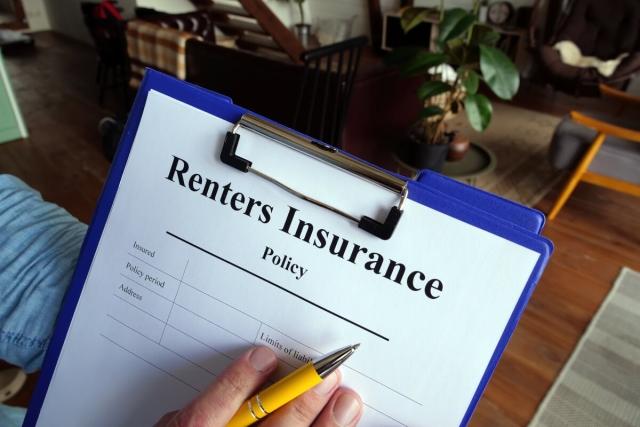As a renter, you must learn to expect the unexpected. Whether a nasty storm knocks a tree down on your home or a thief breaks in to steal your belongings, accidents and emergencies can happen to anyone. This is why it’s important to get renters insurance coverage.
Renters insurance protects you, your personal belongings, and your finances from unforeseen losses. While not always required by law or the landlord, renters insurance is a vital component to stress-free renting. Without it, you could be left facing financial ruin in the event of a disaster.
In this article, we’ll deep dive into all things renters insurance, including common inclusions, exclusions, misconceptions, and more. Here’s a preview of what we’ll cover:
- What is renters insurance?
- What renters insurance covers
- What renters insurance doesn’t cover
- Optional add-ons for renters insurance policies
- Common misconceptions about renters insurance
- How to choose the right renters insurance policy
What Is Renters Insurance?
Renters insurance is a type of coverage designed to protect a tenant’s personal belongings and liability. This coverage extends to anyone who rents a home, whether it be an apartment, townhouse, condo, or single-family property. Often, landlords and property managers will require tenants to be insured before signing a lease. However, in the case that they don’t, it’s still advised to get coverage to financially protect yourself from incidents like theft, fire, water damage, and more.
What Renters Insurance Typically Covers
While renters insurance policies can be customized, they always start with three main components: personal property, liability, and additional living expenses coverage. Each of these pillars safeguards tenants from varying situations, from burglaries to acts of vandalism. Let’s take a look at each component to learn more:
Personal property
Personal property coverage applies to your clothing, furniture, electronics – pretty much anything you own in your rental property. In case any of your items are stolen or damaged, your renters insurance policy will cover all repair or replacement costs. In fact, policy coverage may also extend to items outside your home. For example, if something is stolen from your car parked outside your home, you may also be eligible for repair or replacement reimbursement.
Liability coverage
Liability coverage takes care of accidents that happen within your home’s four walls. Say you have a guest over and they fall down the stairs. And in doing so, they not only hurt themselves but also cause damage to your banister or steps. This is where personal liability protection comes in handy. In this case, your insurance can help cover medical expenses for the injured guest and also reimburse you for any property repairs caused by the accident. A standard policy will usually offer up to $500,000 in liability coverage.
Additional living expenses
Additional living expenses pertain to any costs incurred if your home is damaged to the point where it’s unhabitable. For example, if there’s a fire in your rental, your renters insurance will cover the costs for temporary housing. It can also cover restaurant meals, transportation, and other costs needed for your daily living while you’re displaced.
What Renters Insurance Doesn’t Cover
Now that we know what renters insurance covers, let’s talk about what it doesn’t. Yes, your renters insurance protects you from threats to your own belongings or the home’s habitability. However, it does not cover everything. Here are some common renters insurance exclusions to be aware of:
Flood and earthquake damage
Your renters' insurance policy will explicitly outline situations where coverage applies. Most standard policies will mention fire, theft, and vandalism. However, they won’t always list natural disasters, like floods and earthquakes.
Where you live plays a huge part in receiving flood and earthquake coverage. If you’re in a high-risk area, your policy might include specific natural disaster protections or offer them as an add-on. If you live somewhere like California, where earthquakes are common, opting for this additional coverage is probably wise. However, if you’re in a low-risk area, you probably won’t need the extra coverage.
Normal wear and tear
While personal liability coverage will cover property damage in certain situations, it’s not completely foolproof. If your home is damaged due to normal wear and tear, negligence, misuse, or even intentional damage, you’ll have to face the costs on your own. This is why it’s important to properly maintain your home throughout your lease, addressing issues promptly and efficiently to avoid these kinds of damage.
Roommate’s belongings
Just because you’re a policyholder doesn’t automatically mean your roommate is too. Most renters insurance policies won’t cover your roommate’s things unless you’re both on the policy. However, not every state or insurance provider allows for joint policyholders. In that case, make sure both you and your roommate have coverage.
High-value items without endorsements
Personal property coverage has limits when insuring high-value items. Expensive jewelry, collectibles, and artwork, for example, may not be covered if they exceed a certain value. If you have items that are valued above policy limits, typically $1,000-$2,000, contact your insurance provider for additional coverage.
Optional Add-Ons and Riders
As mentioned earlier, renters insurance policies are completely customizable. If you so choose, you can add on to your policy and ensure coverage in all aspects of your life. Whether you’re a pet owner or an art collector, here are some add-ons or riders you might consider for your renters insurance policy:
Scheduled personal property
Scheduled personal property protection increases your coverage limits on expensive items like jewelry, furs, art, etc. It goes beyond standard personal property policies and caters to renters with high-value items. Instead of having a general coverage limit for all personal property, you can itemize each high-value item and specify its worth to ensure proper protection.
Pet liability
Pet liability insurance is another common add-on for renters. This covers any property damage or injuries caused by your pet. Whether your mischievous pup scratches the walls or your stealthy cat accidentally trips a guest, pet liability coverage safeguards you from these types of mishaps.
Identity theft protection
Many renters also add identity theft protection to their policies. This can cover expenses incurred if your identity is stolen, such as legal fees, lost wages, and credit monitoring services. So, if your wallet is stolen from inside your home, both your personal property and identity theft protection policies would come into play.
Common Misconceptions About Renters Insurance
First-time renters often question the need for renters insurance. “If my landlord doesn’t require it, is it really necessary?” Such doubts often stem from widespread misconceptions about what renters insurance actually covers. Below, we’ll address some of these myths and provide clarity on the importance and necessity of having renters insurance.
“I don’t need it because my landlord has insurance.”
Landlord insurance is not the same as renters insurance. Landlord insurance protects the property owner, safeguarding the home’s physical structure, liability for on-site injuries, and loss of rental income if the home becomes unhabitable. It does not, however, extend to a tenant’s personal belongings.
Don’t assume that your landlord’s insurance policy has you covered. Without your own coverage, you’re at risk of zero financial reimbursement in case of theft, damage, etc. The landlord’s insurance policy may also not cover injuries sustained by you while on the property, so it is important to have renters insurance to protect yourself.
“I can’t afford it. Renters insurance is too expensive.”
One of the biggest misconceptions about renters insurance is the cost. Many use price as an excuse to opt out of coverage, but policies are very affordable. The average cost of renters insurance is about $15-$20 per month, which can easily fit into most people’s budgets. Specific rates will depend on your location, insurance provider, coverage needs, and the type of property. However, you can generally expect an affordable rate of no more than $400 per year.
“I don’t need it because I don’t own much.”
While it may seem like you don't own enough to warrant getting renters insurance, it's important to consider the value of your belongings. Even if you don't have expensive items, the cost of replacing all of your furniture and clothing can quickly add up. And in case of a disaster such as a fire or theft, having renters insurance can provide peace of mind knowing that you can replace your belongings without digging into savings.
How to Choose the Right Renters Insurance Policy
Now that you know all the basics of renters insurance, let’s talk about choosing a policy. Renters insurance coverage isn’t one-size-fits-all. So, it’s important to select a policy that aligns with your unique needs and preferences. Here are some tips to get started:
Compare providers
Just like with any type of insurance, it’s important to shop around and compare providers by getting renters insurance quotes. Look at what different companies offer in terms of coverage, deductibles, and premiums. This will give you a better understanding of the market and help you make an informed decision.
Determine your coverage needs
Before choosing a renters insurance policy, take some time to evaluate your belongings and determine how much coverage you need. Make a list of all your valuable possessions such as electronics, jewelry, furniture, etc. and estimate their total value. This will give you an idea of how much coverage you should get.
Understand deductibles and coverage limits
When looking into renters insurance policies, it is important to understand how deductibles and coverage limits work. The deductible is the amount you have to pay out of pocket before your insurance kicks in, while the coverage limit is the maximum amount your insurance will cover for a specific item or category. Be sure to choose a deductible that works for your budget and consider getting additional coverage if necessary.
Conduct an annual renters insurance review
Going over your renters insurance yearly makes sure that everything is up to date, and you have comprehensive coverage.
Learn More About Renters Insurance on Apartments.com
Got questions about renters insurance? Apartments.com is here to help you make confident, informed decisions about your coverage. Whether you’re settling into a new apartment or looking to update your policy, our comprehensive resources can guide you every step of the way. Dive into our extensive collection of resources to learn more about renters insurance and other essential topics for apartment living.
FAQs
Does renters insurance cover theft?
Yes, renters insurance typically covers theft of your belongings, whether it occurs inside your rental or outside, such as from your car. Be sure to check your policy limits and deductible to understand how much coverage you have.
Does renters insurance cover water damage?
Renters insurance usually covers water damage caused by sudden events, like a burst pipe or an accidental overflow. However, it typically does not cover damage from flooding or sewer backups unless you purchase additional coverage.
Does renters insurance cover fire?
Yes, renters insurance generally covers damage to your belongings caused by fire. It can also help with temporary living expenses if your rental becomes uninhabitable due to fire damage.
Does renters insurance cover roommates?
Renters insurance typically does not cover your roommates unless they are listed on your policy. It’s recommended that each roommate get their own renters insurance policy for individual coverage.
What does renters insurance not cover?
Renters insurance usually doesn’t cover damages caused by natural disasters like floods or earthquakes unless you add specific coverage. It also won’t cover your landlord's property or any intentional damage caused by you.






